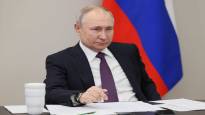The Hague’s International Criminal Court ICC has issued the Russian president About Vladimir Putin international arrest warrant.
Emeritus Professor of International Law, Academician Martti Koskenniemi sees that the order is not just a declaration, but without any doubt has a practical meaning.
Koskenniemi thinks that practical meaning can be sought through three different perspectives.
1. Comparison of the case of Sudanese President al-Bashir
The situation can be compared to a similar event in the recent past, when the president of Sudan Omar al-Bashir was subject to an arrest warrant.
In principle, he should have been arrested if he had traveled to countries that maintained good relations with the International Criminal Court, i.e. virtually all countries that are members of the ICC. There are 123 of them.
However, Al-Bashir traveled to ICC countries in Africa. It was possible because the arrest warrant issued by the ICC reinforced the feeling in Africa that the ICC is biased and only prosecutes African heads of state and warlords. That is why some African states defied the arrest warrant, even though they were members of the ICC.
Now Putin surely cannot set foot in the chamber of a country that is a party to the ICC. But he probably wouldn’t step anyway.
2. Importance regarding the general international situation
The arrest warrant sharply divides the international community into two camps.
This highlights the fact that some countries are happy to deal with Russia. There are more and more of these countries, especially in Africa. China is not a party to the ICC, but even if it were, it certainly wouldn’t take action.
The arrest warrant therefore reinforces the confrontation between countries that belong to the ICC and support it, as well as other countries.
3. May hinder the conclusion of a peace agreement
What happens in a situation where a peace treaty should be concluded? Is there any reason for Putin to make a peace deal if Putin thinks he will be arrested and imprisoned for life afterwards? This may reduce the motivation to engage in peacemaking.
Does the ICC appear biased?
Koskenniemi says that he personally has never been a big supporter of the ICC.
– It has its own benefit in some situations. It is good and necessary when you need to study, for example, middle-level military leadership. For example, if an order has been given to kill civilians or prisoners of war. But its harmfulness is accentuated when it comes to senior heads of state and senior military leadership. It is difficult to demonstrate a cause and effect relationship between a political decision and a crime.
Koskenniemi reminds us of what happened in 1919, when peace was concluded after the First World War. When the German Kaiser Wilhelm was found guilty of World War I, the Germans felt that the League of Nations system was aimed specifically against their country.
According to Koskenniemi, it is not clear that accusing Putin of being a war criminal makes sense from the point of view of the system.
He reminds that George W. Bush and Tony Blair’s The 2003 invasion of Iraq that left thousands dead was illegal. However, the ICC did not intervene.
– The idea that the system works in a biased manner is not far-fetched. If the criminal justice system appears biased, it is not good for the system or the world in general. It also does not support the effective implementation of the system. It gives Putin a basis to claim that it is a political system created to morally and legally condemn Russia. Such an outcome should be avoided.
See Arena: Putin’s dangerous road
